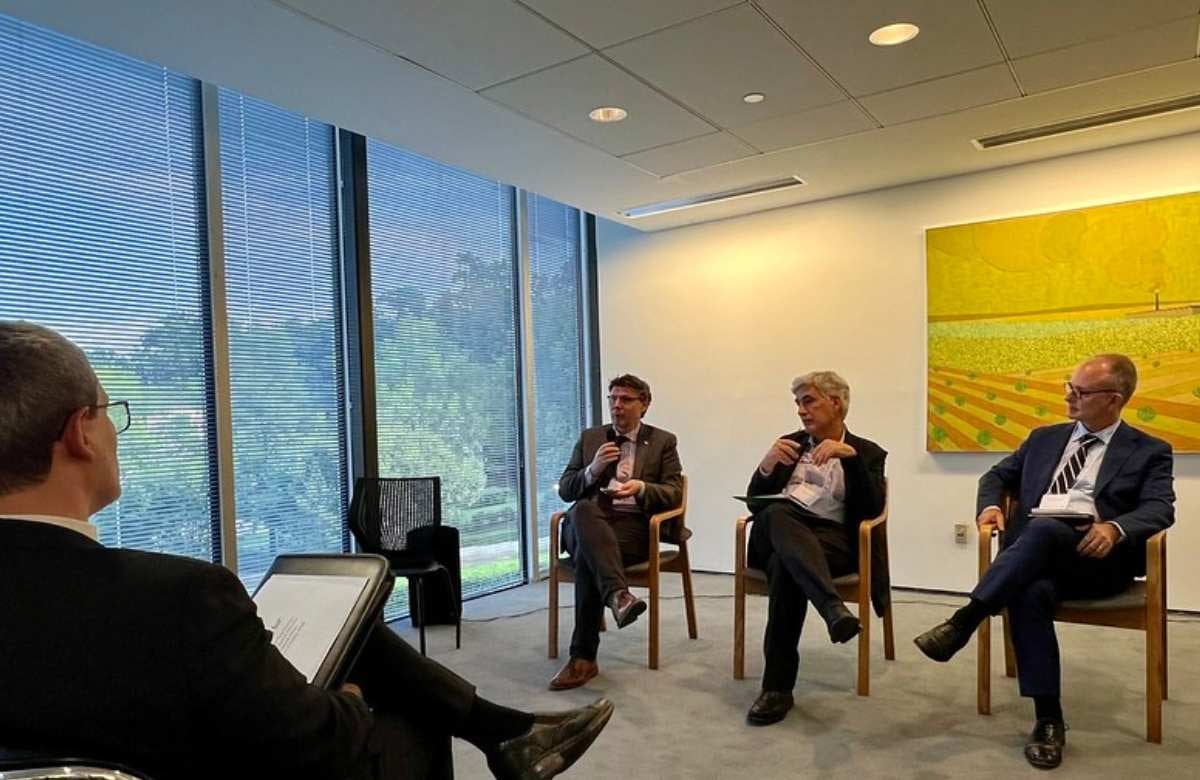
Washington, D.C., 25 June 2024 (PAHO) – Members of the Executive Committee of the Pan American Health Organization (PAHO) joined the Alliance for Primary Health Care for a dialogue on health systems resilience at the Embassy of Brazil. The discussion focused on how the collaboration of PAHO, the Inter-American Development Bank (IDB), and the World Bank can best benefit countries efforts in expanding primary health care (PHC) as the foundation of resilient health systems.
The event brought together Jarbas Barbosa, Director of PAHO; Maria Luiza Ribeiro Viotti, Ambassador of Brazil to the United States; Alexandre Pena Ghisleni, Head of the Special Office for International Affairs, Ministry of Health, Brazil; and Loyce Pace, Assistant Secretary for Global Affairs, Department of Health and Human Services, United States.
Maria Luiza Ribeiro Viotti opened the event by emphasizing the social and economic repercussions of the pandemic, particularly in Latin America and the Caribbean. She highlighted the opportunity to hear from authorities and experts on initiatives to strengthen health systems. "Health is a key determinant of economic development and social stability; Brazil is proud to host the largest universal health care system (SUS) and also renowned health research institutions (Fiocruz and Butantan)," she said.
Launched in December 2023, the Alliance for Primary Health Care in the Americas aims to strengthen primary health care throughout the Americas. "It has truly been impressive to see how this initiative has captured the attention of countries throughout the Americas and globally, from both the health and finance sectors," said Jarbas Barbosa. He commended the World Bank and the IDB for their continued and deepening partnership with PAHO in promoting PHC and strengthening resilient health systems in the region.
“We are already seeing the potential and impact of the Alliance on health systems transformation through political advocacy and policy dialogues, such as those taking place in Honduras, Panama, and Colombia,” said James Fitzgerald, Director of Health Systems and Services at PAHO. He emphasized that on health financing, the Alliance can work collectively to improve financial protection in health, and strengthen the alignment between the finance and health sectors. Fitzgerald noted that the Alliance is also playing a role in accelerating action on innovations in health systems, including digital health strategies and the strategic procurement of health services.
Juan Pablo Uribe, Global Director for Health, Nutrition, and Population and the Global Financing Facility for Women, Children, and Adolescents at the World Bank, stated that the Alliance is designed to help countries' leadership in strengthening capacities, ensuring action in countries. He explained that the Alliance brings coordinated support in areas of financing and knowledge exchange to countries to strengthen their paths towards the achievement of Universal Health Coverage. Uribe stressed the importance of coordinating work at the country level to strengthen capacities in PHC, leveraging PAHO's technical and normative leadership, and aligning financing with health priorities. He also emphasized the need to generate evidence on PHC and integrate it into policy discussions.
Ferdinando Regalia, Manager of the Social Sector at IDB, pointed out that the IDB invests strategically to foster transformation, with PHC being at the center of a significant portion of their investments in the region, in 19 of their 26 member countries, both at the national and subnational levels. Regalia also highlighted the close collaboration with PAHO in digital transformation, collaborating with PAHO in 20 countries, and their strong partnership in Central America on malaria elimination, focusing on community engagement and PHC in remote communities.
At the event, authorities from the region shared experiences in advancing health systems transformation through Primary Health Care in the region. Gabriela Gomez Castillo, Director of the Department of External Relations and Cooperation at the Ministry of Health in Uruguay, emphasized the need for initiatives that address the realities of primary health care in Latin America and the Caribbean. She mentioned that the region faces many challenges in PHC and that international cooperation, including the Alliance, can support the acceleration of action through sharing good practices and lessons learned.
Carlos Alvarenga, Vice Minister of Management and Development at the Ministry of Health, El Salvador, expressed the importance of mobilizing international partners around national priorities in health systems strengthening. He stated that with the Alliance, El Salvador is working with three key strategic partners within the health sector, strengthening national capacities and competency development, improving results in health. Alvarenga highlighted the importance of creating synergies among partners around the model of care based on PHC, with organized planning process in the short, medium, and long term.
The dialogue underscored the critical role of the Alliance for Primary Health Care in fostering collaboration and innovation to address health challenges across the Americas. Through continued partnership and strategic investments, the Alliance aims to enhance primary health care systems and improve health outcomes for all.
Additional information on the Alliance for PHC can be found here.




